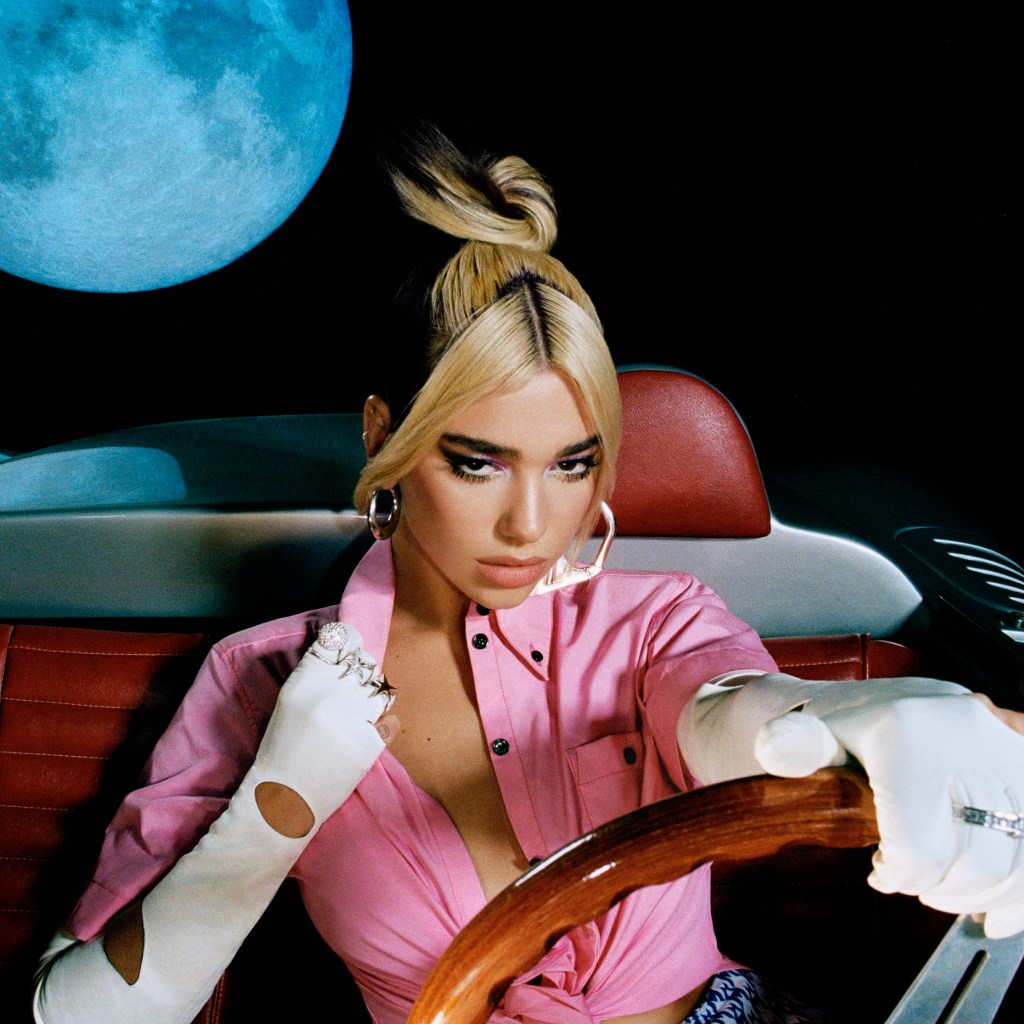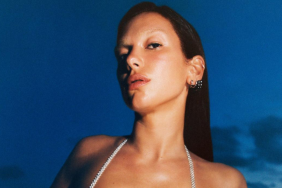The UK’s Dua Lipa deserves to be proclaimed pop music’s reigning disco diva with Future Nostalgia – her luminous second album all flawless grooves and bops. Lipa took to Instagram Live to announce that Future Nostalgia would drop a week earlier than the scheduled 3 April amid the COVID-19 pandemic – and, yes, it will bring “joy”. Future Nostalgia is a feel-better LP.
The now-platinum blonde singer/songwriter is repping an Albanian diaspora in pop, alongside Rita Ora, Bebe Rexha and Ava Max. Lipa broke out back in 2015 with the Euro-dance ‘Be The One’ – the first of successive singles from 2017’s eponymous debut. But she became a cultural phenom with ‘New Rules’, a tropical house banger championing female empowerment. In 2019, this Queen of Streams received the coveted Grammy for ‘Best New Artist’. Future Nostalgia will establish her longevity. It’s an album of sex and sensibility.
The husky vocalist ushered in her Future Nostalgia sonic era late last year with the lead single ‘Don’t Start Now’. Sounding nothing like ‘New Rules’, ‘Don’t Start Now’ is a cross between vintage disco and ’90s piano-house. However, it has the same producer – Ian Kirkpatrick. Symbolically, Lipa again sings about why she keeps moving. Indeed, similarly to ‘New Rules’, it’s both a break-up and a wake-up song.
Since her premiere album, Lipa has collaborated with credible dance music figures. She enjoyed a mega-hit with Calvin Harris, ‘One Kiss’, while Silk City (Diplo and Mark Ronson) recruited her for their jam ‘Electricity’ – which won another Grammy. And Future Nostalgia sleekly capitalises on that momentum. Lipa has solicited an attentive producer in Stuart Price – the Brit DJ/musician who, having pioneered electroclash, anchored Madonna’s 2005 disco reinvention Confessions On A Dance Floor. Notably, Future Nostalgia doesn’t rely on guests. In fact, Lipa hasn’t used the material she reportedly recorded with Chic’s Nile Rodgers, although his influence is pervasive.
Future Nostalgia functions as a clever concept project – like Frank Ocean’s epochal mixtape, nostalgia,ULTRA, postmodern temporal inversion is the theme. Lipa aspires to a pop classicism, revelling in more live instrumentation. But Future Nostalgia is progressive with electronic currents. In a press release, Lipa says, “I realised that what I wanted to make was something that felt nostalgic, but had something fresh and futuristic about it, too.”
As such, on the record, Lipa revives funk and disco, but as refracted through the disco-house that defined popdom around the turn of the Millennium – still ironic as she was only born in 1995. It was the time when Moloko and Sophie Ellis-Bextor aired crossover nu-disco romps. Even the teen-pop princess Britney Spears’ fold had San Francisco’s Miguel Migs, fronting the West Coast deep house movement, remix ‘Stronger’ – charming snobby underground DJs. Future Nostalgia has that fluidity. (Lipa has actually cited Madonna and Moloko as inspirations.) Future Nostalgia‘s celebratory spirit is also Lipa’s nod to her LGBTQIA+ fandom, the star recently headlining the Sydney Mardi Gras Party. Nonetheless, Future Nostalgia is grown-up, lyrically. Lipa may be savvy on social media, but she’s shed flippantly viral song titles like ‘IDGAF’.
The prefatory robo-funk titular-track – produced by Jeff Bhasker, who, though associated with Kanye West, significantly blessed Ronson’s ‘Uptown Funk’, featuring Bruno Mars – serves as a manifesto. Lipa has previously ‘rapped’ (cue ‘Blow Your Mind (Mwah)’). But, here, she sassily channels Blondie’s Debbie Harry, circa ‘Rapture’. The self-declared “female alpha” flexes, “You want a timeless song, I wanna change the game/Like modern architecture, John Lautner coming your way.” ‘Break My Heart’ is the LP’s big throwback number, liberally borrowing from INXS’ ‘Need You Tonight’. A cautious Lipa anticipates the vulnerability of new love.
Mind, Future Nostalgia is too stylistically intelligent to be solely about retro emulation. The album reveals key modish dance cuts. Price assists with ‘Cool’ – Lipa, subliminally Auto-Tuned, strutting to its epic clubby synths and urban-tough bassline, potentially impressing Beyoncé and Rihanna alike. Price’s touch can also be discerned on ‘Hallucinate’, a euphoric house anthem. ‘Physical’ riffs off the Aussie Olivia Newton-John’s global ’80s smash of the identical name (if not the decade’s aerobics trend), but aesthetically it’s closer to Boys Noize’ German techno.
Above all, Future Nostalgia is concentrated – with zero filler or spiller. Lipa lets us hit the bar for cocktails during hip-swayers like the cowbell-laden ‘Pretty Please’ and cheeky ‘Good In Bed’. Yet she withholds the quiet storm ballads. The most sobering selection is the meta orchestral finale, ‘Boys Will Be Boys’, in which Lipa confronts male privilege, decries sexual harassment, and pre-empts any responding toxic indignation (“Boys will be boys/But girls will be women”). Lipa intuits that disco freedom and hedonism require a code of respect.
In many ways, Lipa has fulfilled the peaceful disco revolution Katy Perry signalled with ‘Chained To The Rhythm’. There is no murder on the dancefloor at her party. So Future Nostalgia should assure Lipa’s ongoing presence in the charts – and the public consciousness. Moreover, with its mirrorball communalism, optimism and message of resilience, the album ultimately feels like a tonic for today’s uncertainty. Lipa has captured the zeitgeist.
–
‘Future Nostalgia’ is out today. Stream and download here.












